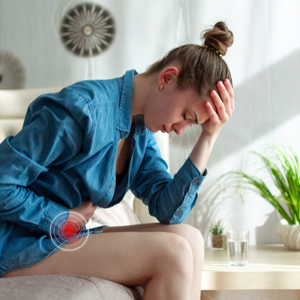
What is premenstrual syndrome?
Many women experience abdominal pain or headaches before the onset of their menstrual period. Some may also experience mood swings. In addition to sadness or irritability, a general feeling of malaise may set in. Doctors call this phenomenon premenstrual syndrome (PMS) and by this they mean the psychological and physical complaints that can appear two weeks to a few days before the onset of menstruation. For the majority of women, PMS symptoms are not even particularly severe. Other women, however, suffer from such severe symptoms that they can no longer go about their normal daily activities. You can find out how to treat PMS in this article.
What are the causes of premenstrual syndrome?
Doctors have not yet uncovered the causes of PMS beyond doubt, but they assume that the hormonal fluctuations in the female cycle play a decisive role in the development of PMS. Women who suffer from PMS do not necessarily have altered hormone levels, but they may be particularly sensitive to breakdown products of the hormone progesterone. This hormone is produced mainly in the second half of the cycle, i.e. before the onset of menstrual bleeding. Doctors also suspect that genetic predisposition as well as environmental factors can be responsible for the development of PMS.
How common is premenstrual syndrome?
Many women experience some mild PMS symptoms from time to time before they start menstruating, but it hardly affects them in any way. About 20 to 40 percent of all women, however, complain about more pronounced PMS symptoms. These can become so severe that they are also noticeable in everyday life. Far fewer women, namely three to eight percent of all women, suffer from psychological symptoms in particular, which can become so severe that they can no longer cope with their everyday lives. Doctors refer to this as premenstrual dysphoric disorder (PMDS).
What are the symptoms of premenstrual syndrome?
In addition to feelings of tension in the chest and/or abdomen, there may also be headaches, joint pain, back pain or muscle pain. Some women also complain of water retention, reduced sleep quality, digestive problems, skin blemishes and/or food cravings.
Almost all women who suffer from PMS often feel exhausted, depressed, listless, angry and/or irritable in the days leading up to their period. Some also have problems concentrating and (severe) mood swings. If the PMS symptoms are particularly severe, they can interfere with a woman's daily life and may even affect her relationships with family, friends and/or work colleagues.
What forms of premenstrual syndrome are there?
Doctors speak of premenstrual dysphoric disorder (PMDS) when the symptoms have a significant impact on the psyche of the person concerned and can even trigger feelings of depression and/or anxiety.
What is the course of premenstrual syndrome?
Most women experience PMS symptoms mainly in the second half of the menstrual cycle, i.e. after ovulation. During this time, the female sex hormone oestrogen drops and the body produces more of the hormone progesterone. With the onset of menstruation and the beginning of a new cycle, PMS symptoms also decrease and disappear completely at the latest with the end of menstruation. They do not reappear until the next ovulation. It can also happen that women who suffer from PMS only have symptoms from time to time. The extent and severity of the symptoms can also vary.
How is premenstrual syndrome diagnosed?
The gynaecologist will first take the patient's medical history and ask about her symptoms and when exactly they occur. Premenstrual syndrome should be distinguished from other diseases that have similar symptoms. This is the only way to distinguish PMS from depression, thyroid disease or irritable bowel syndrome.
How is premenstrual syndrome treated?
It often varies from woman to woman which treatment method is effective for premenstrual syndrome. Women are therefore advised to try different remedies and methods to find the one that relieves the symptoms. For mild premenstrual symptoms, for example, relaxation methods, acupuncture, sufficient exercise, the reduction of alcohol and/or coffee or a low-salt diet can be promising. Herbal preparations and/or dietary supplements such as St. John's wort, monk's pepper, calcium or vitamin B6 can also provide relief.
Women who suffer from more severe premenstrual symptoms can resort to the following medicines:
- hormonal medications: In addition to hormone patches, the contraceptive pill can also be used here, which influences hormone levels and thus alleviates the symptoms of premenstrual syndrome.
- Antidepressants: If you have severe psychological symptoms, SSRIs (selective serotonin reuptake inhibitors) can help to relieve premenstrual symptoms.
- Painkillers: can be effective for severe menstrual pain. However, it is not yet sufficiently known whether they can also be used effectively to treat PMS symptoms.
